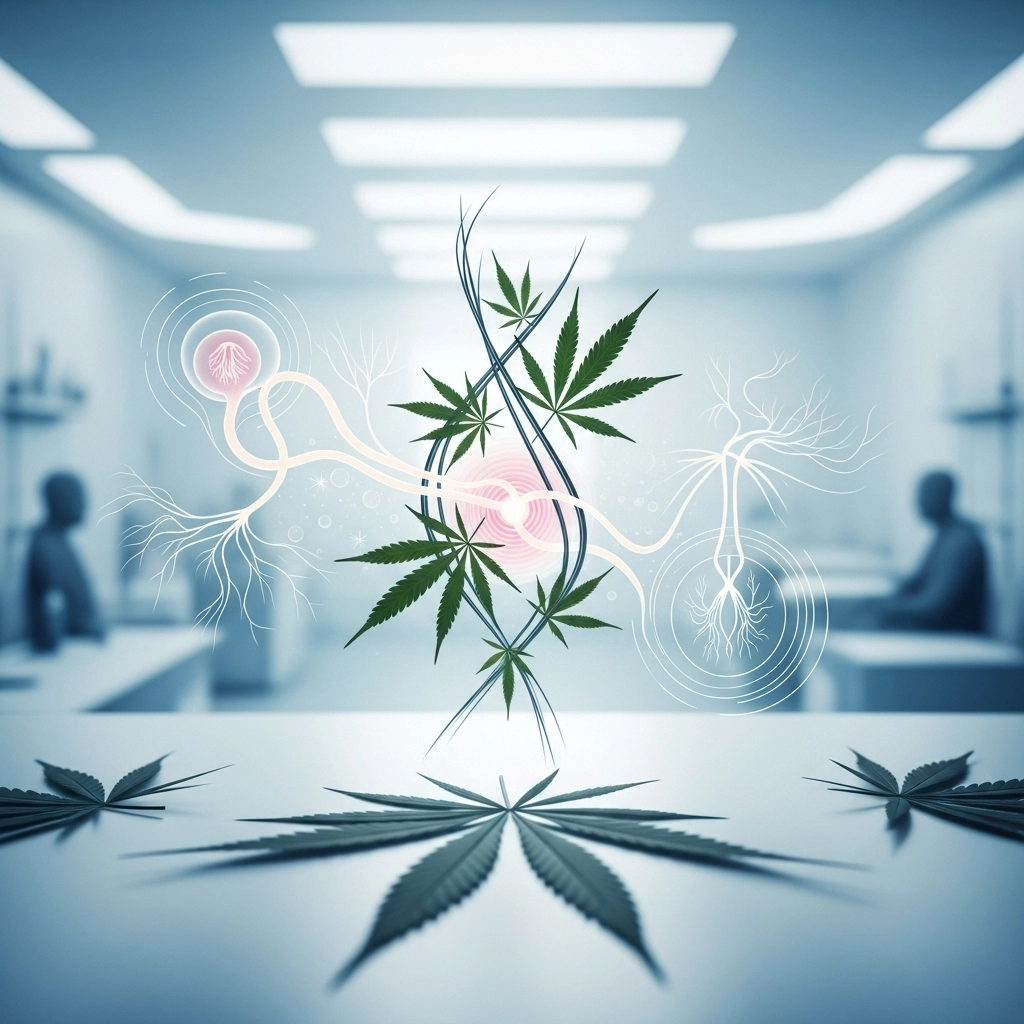Cannabis for Pain Management: A Modern Approach to the Opioid Crisis
ImageFX (2025) The United States is grappling with an opioid epidemic of unprecedented scale, a public health crisis that continues to devastate communities and families. In this challenging landscape, the medical community is actively seeking effective and less addictive alternatives for pain management. Amidst this search, cannabis and its derived compounds have emerged as a compelling area of research, showing significant promise for the treatment of chronic and neuropathic pain. While the connection between the opioid crisis and cannabis might not be immediately obvious, a growing body of scientific evidence suggests a profound link. Studies indicate that the strategic use of cannabis can potentially diminish the negative and addictive effects associated with opioid use, all without compromising essential pain relief. The implications of these findings are nothing short of staggering, potentially paving the way for advanced pain treatment options and offering a much-needed respite from this devastating crisis. The current opioid epidemic is characterized by widespread addiction, overdose deaths, and a cycle of dependence that is incredibly difficult to break. Traditional opioid medications, while highly effective for severe pain, carry a high risk of physical dependence and addiction, often leading to painful withdrawal symptoms that can drive individuals back to substance use. This creates a cruel paradox where the very treatment for pain becomes a source of immense suffering. In response to this urgent need, researchers and healthcare providers are exploring novel approaches to pain management. Medicinal cannabis, with its diverse array of cannabinoids, has shown a remarkable capacity to influence the body's endocannabinoid system, which plays a crucial role in regulating pain, mood, and appetite. Unlike opioids, cannabis exhibits a significantly lower potential for physical addiction and a far more favorable side effect profile, making it a compelling candidate for a safer pain therapeutic. The therapeutic effects of medicinal cannabis are primarily attributed to its various cannabinoids, such as tetrahydrocannabinol (THC) and cannabidiol (CBD), which interact with cannabinoid receptors (CB1 and CB2) found throughout the body. While the precise mechanisms by which these cannabinoids influence nerve activity and pain signaling are still subjects of ongoing research, their impact on pain perception is undeniable. A critical distinction between cannabis and opioids lies in their addictive potential: Opioids: Drugs like oxycodone and codeine are highly physically addictive. Their use can quickly lead to habituation, where the body becomes dependent on the drug to function normally. Withdrawal symptoms are often severe and include intense pain, nausea, vomiting, and muscle cramps, which can perpetuate the cycle of addiction and increase the risk of overdose. Cannabis: The addictive properties of cannabis are considered to be of much lower potential and are primarily associated with psychological, rather than physical, processes. While "cannabis use disorder" is a recognized condition, it does not typically involve the severe physical withdrawal symptoms seen with opioids. Furthermore, there have been no reported cannabis overdoses to date, reinforcing its safety profile as a pain therapeutic. This fundamental difference in addiction liability underscores cannabis's potential as a safer alternative or adjunct in pain management strategies. Recent research has illuminated a powerful synergistic effect when cannabis is administered alongside opioids for pain relief. Studies indicate that the combined use of cannabis can lead to a reduction in the effective opioid dosages required to achieve the desired therapeutic effects. This means that cannabis can potentially serve as a substitute for a portion of the opioid dosage, thereby significantly lowering the chances of developing opioid addiction. Beyond direct pain relief, specific cannabinoids offer unique benefits: Cannabidiol (CBD): Unlike THC, CBD is non-intoxicating, meaning it does not produce the "high" associated with cannabis. CBD has distinct mechanisms of action that have been shown to reduce drug cravings and alleviate opioid withdrawal symptoms. This makes CBD a particularly promising, safe, and non-intoxicating alternative, especially for patients seeking to reduce or discontinue opioid use. Its ability to mitigate cravings is crucial, as these often steer individuals back into relapse following opioid withdrawal, perpetuating the cycle of addiction. By minimizing the chance of relapse, CBD can significantly lessen the chances for long-term addiction. This synergistic approach offers a multi-faceted strategy: reducing the initial opioid dose, providing additional pain relief, and actively supporting the patient through the challenging process of opioid reduction or cessation. The theoretical benefits of cannabis in pain management are increasingly supported by real-world patient experiences. A recent poll of pain therapy patients revealed compelling insights into the practical application of cannabis as an opioid alternative: Reduced Opioid Dosage: A large percentage of respondents reported that cannabis use effectively lowered the necessary dose of opioid required for their pain relief. Mitigated Side Effects: Patients noted a significant diminution of opioid side effects when cannabis was incorporated into their treatment regimen. Improved Tolerability: The residual effects of their pain treatment became more tolerable with cannabis use. Comparable Efficacy: A sizable proportion of patients stated that cannabis was equally, and in some cases, even more effective than opioids in managing their pain. Strong Preference: Critically, over 70% of respondents reported a clear preference for cannabis and indicated they would use it more frequently if it were more readily available. These patient testimonials underscore the urgent need for further research and development in cannabis-based therapeutic regimens for pain management. The potential for cannabis to significantly impact the current opioid epidemic is clear, offering a beacon of hope for a crisis that demands innovative solutions. The integration of cannabis into pain management protocols holds immense promise, not only for alleviating chronic pain but also for providing a safer pathway away from opioid dependence. As research continues to unfold, the role of cannabis in modern medicine will undoubtedly expand, offering new avenues for patient care. Explore our full catalogue of cannabis laboratory testing equipment. Visit LabX today to learn more. Is cannabis addictive, and how does it compare to opioids?
Cannabis has a significantly lower potential for physical addiction compared to opioids. While psychological dependence can occur, it does not typically involve the severe physical withdrawal symptoms associated with opioid addiction. Opioids are highly physically addictive, leading to dependence and severe withdrawal. Can cannabis completely replace opioids for chronic pain?
Current research suggests that cannabis can effectively reduce the necessary dosage of opioids for pain relief and may even serve as a substitute in some cases. However, whether it can completely replace opioids depends on individual patient needs, pain severity, and specific medical guidance. What is the difference between THC and CBD in pain management?
THC (tetrahydrocannabinol) is the primary psychoactive compound in cannabis, contributing to both pain relief and intoxication. CBD (cannabidiol) is non-intoxicating and has shown promise in reducing drug cravings and opioid withdrawal symptoms, offering a therapeutic effect without the "high." Are there any reported overdoses from cannabis use?
To date, there have been no reported cannabis overdoses. This contrasts sharply with opioids, which carry a significant risk of fatal overdose, further highlighting cannabis's safety profile in a medical context.

The Opioid Crisis and the Quest for Safer Pain Management
Unpacking the Biology: How Cannabis Interacts with Pain Pathways
The Power of Synergy: Cannabis as an Opioid Adjunct
Real-World Impact: Patient Experiences and Future Directions
Frequently Asked Questions










